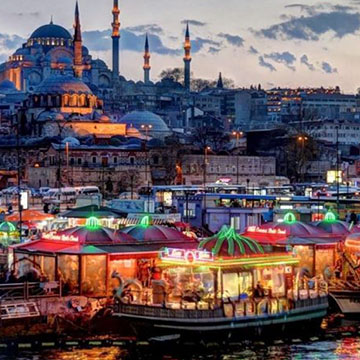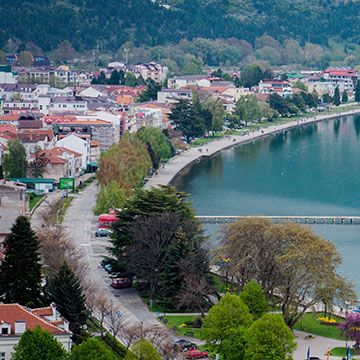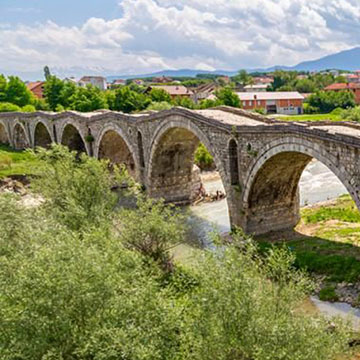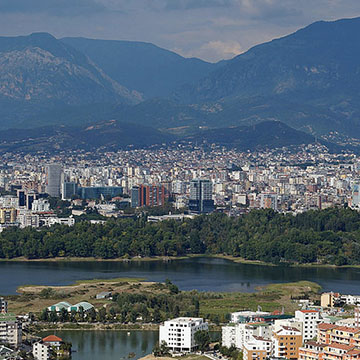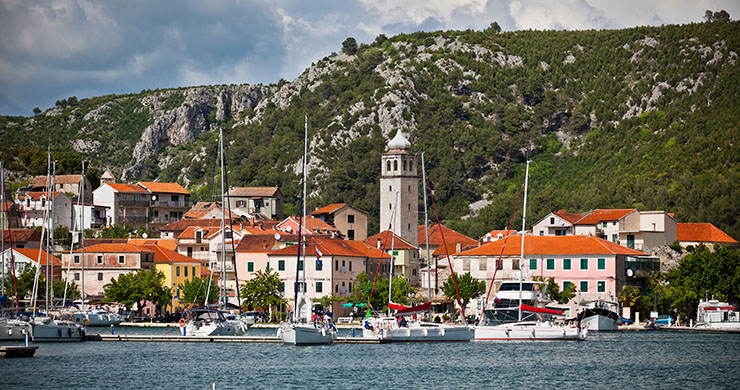
Croatia
Croatia, described as the "pearl of the Adriatic" by English poet Lord Byron, is located at the intersection of Central Europe, the Balkans, and the Mediterranean. The country, with a land area of 56,594 square kilometers, is divided into more than a thousand islands in addition to its continental territory. After years of wars and invasions, Croatia gained its freedom on October 8, 1991.
The country has a temperate and rainy continental climate, with many natural parks. Dubrovnik is the best-preserved medieval city globally, with city walls dating back to the 13th century, baroque churches, and the Maritime Museum being notable attractions.
When to Visit Croatia?
The ideal time to travel to Croatia is during the period of moderate temperatures, which is between May-June and September. While the winter season is cold in the inland areas, the coastal regions, influenced by the Mediterranean, have a milder climate. The region you choose to visit is a determining factor in when to visit Croatia, especially as Dalmatia experiences milder winters compared to the rest of the country. Additionally, Croatia hosts many festivals, particularly in June and October, including dance, film, opera, and classical music events.
Croatian Culture
Considering the date of its independence declaration, Croatia is a relatively young country that has overcome many wars and economic crises. Therefore, the older population in Croatia is somewhat more traditional and conservative. Despite the attachment of the older population to its culture, the younger population in Croatia is more flexible and understanding. Especially, the younger generation is fluent in English, unlike the 65 and older age group, which generally does not speak English.
In Croatia, saying "thank you" is crucial. In rural areas, when someone gives you the way while driving - which they often do - be sure to thank them by waving from the steering wheel, as this is as natural as shaking hands in Croatia.
Croatian Cuisine
Croatia, influenced by various cultures throughout its history due to social and political events, has developed a unique cuisine where the flavors of different cultures intertwine. Despite having a continental climate in the inland areas, the coastal regions showcase distinct flavors influenced by the Mediterranean climate. While coastal areas favor the use of seafood, olive oil, and garlic, the inland areas are known for meat and vegetable dishes influenced by Hungarian, Austrian, and Turkish cuisines. Croatian sausages mixed with various spices and meat varieties, known as "kulen" or "kulenova seka," and dishes such as "čobanac" with mushrooms, wild game meat, and cheese are among the must-try foods in Croatia.
Traditional dishes such as "pasticada" served at weddings and special occasions, as well as Istrian truffles, are also popular. When in Istria, you'll come across "burek," similar to Turkish pastries, and various soups in the inland regions. In winter, Croats prefer potato soup, and in Dalmatia, seafood is abundant. Be sure to try fish soups made from fresh fish from the Adriatic Sea, mixed with olive oil, rice, and garlic.
In addition to black risottos made with cuttlefish ink, particularly squid, traditional desserts such as "Dubrovacka torta," pepper cookies called "paprenjaci," and cream cakes known as "kremsnita" are widely consumed. In terms of beverages, Croatia has a strong drinking culture, being one of the top 15 countries globally in beer consumption. Local beers include Pan, Karlovacka, Oznjsko, and Tomislav (dark beer). The country also produces more than 140 million liters of wine annually, with red wine being more prominent in Istria and white wine in the inland regions. Plavac Mali is the most famous red wine, and Malvazija, Tirasevina, and Pasip are renowned white wine brands. When dining at a restaurant, leaving a tip between 5% and 10% is expected.
Souvenirs from Croatia
There are various souvenir options you can bring back from Croatia. The country's well-developed traditional crafts, especially in embroidery and sewing, offer unique products, especially on the island of Pag.
Croatia's Festivals
Croatia hosts numerous festivals that showcase the country's cultural values and traditions. Additionally, the country is home to many music and cultural arts festivals, making the summer months particularly lively. The Zagreb International Folk Festival brings together countries such as Slovakia, the Czech Republic, Turkey, Russia, and Ukraine, with a focus on local dances and music. The Moreska, held annually on July 14th on Korcula Island, draws inspiration from Croatia's traditional folk stories, featuring a sword dance that symbolizes a war fought by two kings and their soldiers for the love of a woman. Another significant festival is the Dubrovnik Summer Festival, taking place in July, bringing together music, theater, dance, and performance arts. The Love System Festival in May is a house music festival, while the Istria Music Festival, held in June, features large-scale DJ performances. The Petrcane-based festival lasts four days and accommodates around 1000 people, with tree houses as accommodation and boat parties.
Holidays/Feasts/Important Days in Croatia
· Epiphany (January 6)
Easter (March 27)
Labor Day (May 1)
Catholic Holiday (May 26)
Anti-Fascist Struggle Day (June 22)
Statehood Day (June 25)
Thanksgiving (August 5)
Assumption of Mary (August 15)
Independence Day (October 8)
All Saints' Day (November 1)
Christmas (December 25)
Croatia's Climate and Weather
While northern Croatia has a continental climate, the influence of the Adriatic Sea brings a Mediterranean climate to the coastal areas. The first and last months of autumn have moderate temperatures, with cold and snowy winters in the country's inland. In winter, temperatures can drop to -10 degrees, while summer temperatures average around 39 degrees.
Short History of Croatia
In the 6th century, Greek colonies established colonies and built roads in the Dalmatia region, turning Croatia into a region hosting Slavic tribes after a while. Throughout its history, the country experienced invasions from Hungary, Venice, and Austria and remained under Ottoman rule for a long time. Due to this historical background, Croatia, where Central European, Balkan, and Mediterranean cultures intertwine, declared its independence from Yugoslavia on June 25, 1991, and officially announced its independence on October 8, 1991. Germany was the first country to recognize Croatia's independence during the war with the Serbs. After declaring independence, Croatia went through a four-year internal war and joined the European Union in 2013.
Croatia's Economy
Considered today as the most developed Central European country with high living standards, literacy rates, and homogeneous income distribution, Croatia's economy is based on chemical and plastic industries, electronics, aluminum, paper, textiles, and tourism. After the collapse of socialism, the country transitioned to a market economy. The period of the Croatian War of Independence between 1991 and 1992 negatively affected the country, and it experienced an economic crisis in 2007-2008. However, the country, which has grown its economy by 4-5% since then, is now among the countries with the highest education, health, and quality of life standards. Joining the European Union in 2013, tourism, agriculture, forestry, and fishing are significant sources of income, with Croatia hosting around 14 million tourists annually, ranking among the top 20 most popular countries for tourism.
Religion and Belief in Croatia
Christianity is widespread in Croatia, but there is no officially recognized religion. The Roman Catholic Church has a significant presence, with 80% of the population adhering to Catholicism. Orthodox Christians make up 4% of the population.
Turkish Diplomatic Representations in Croatia
ZAGREB EMBASSY
Address: MASARYKOVA 3/2 10000 ZAGREB CROATIA
Phone: 00 385 1 486 46 60 (Switchboard) /46 80 /46 81 (Consulate)
Fax: 00 385 1 486 46 70
Email: embassy.zagreb@mfa.gov.tr
Website: http://zagreb.be.mfa.gov.tr
Languages Spoken in Croatia
The official language of Croatia is Croatian. In addition to German being spoken by the elderly population, the younger generation is fluent in English.


